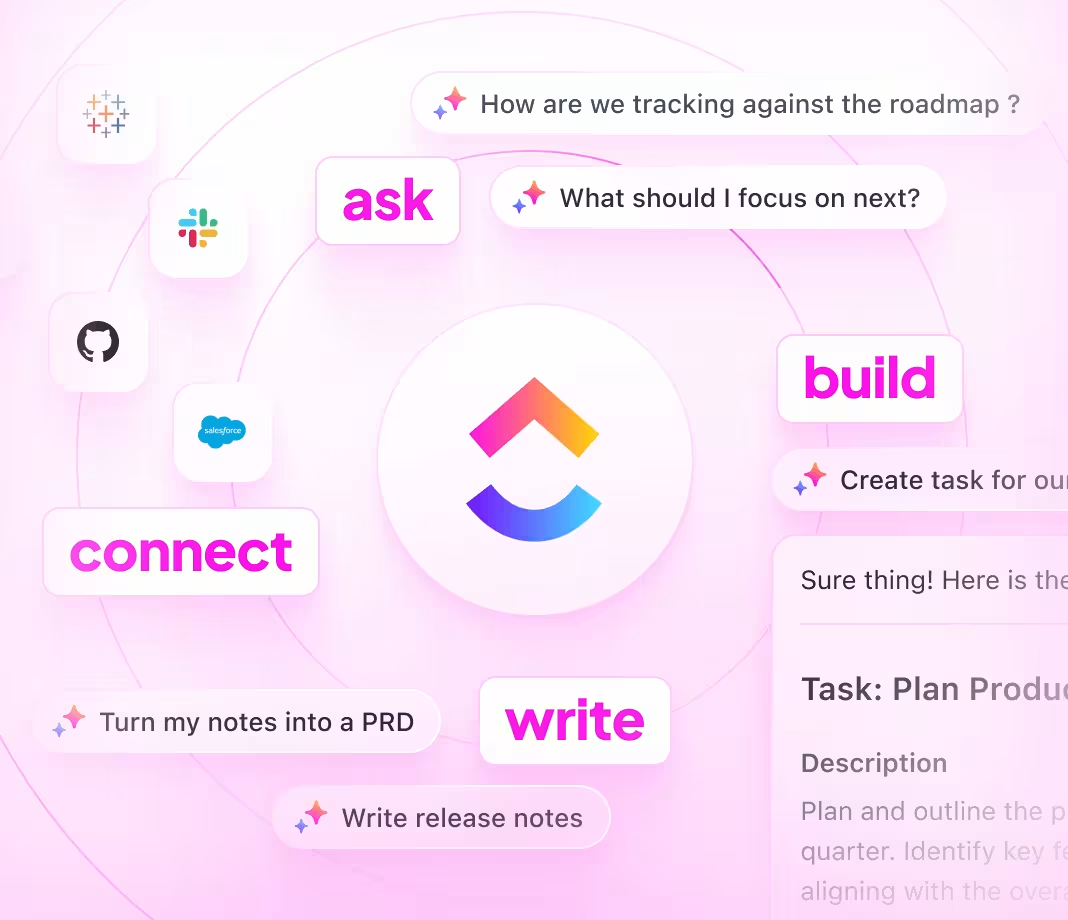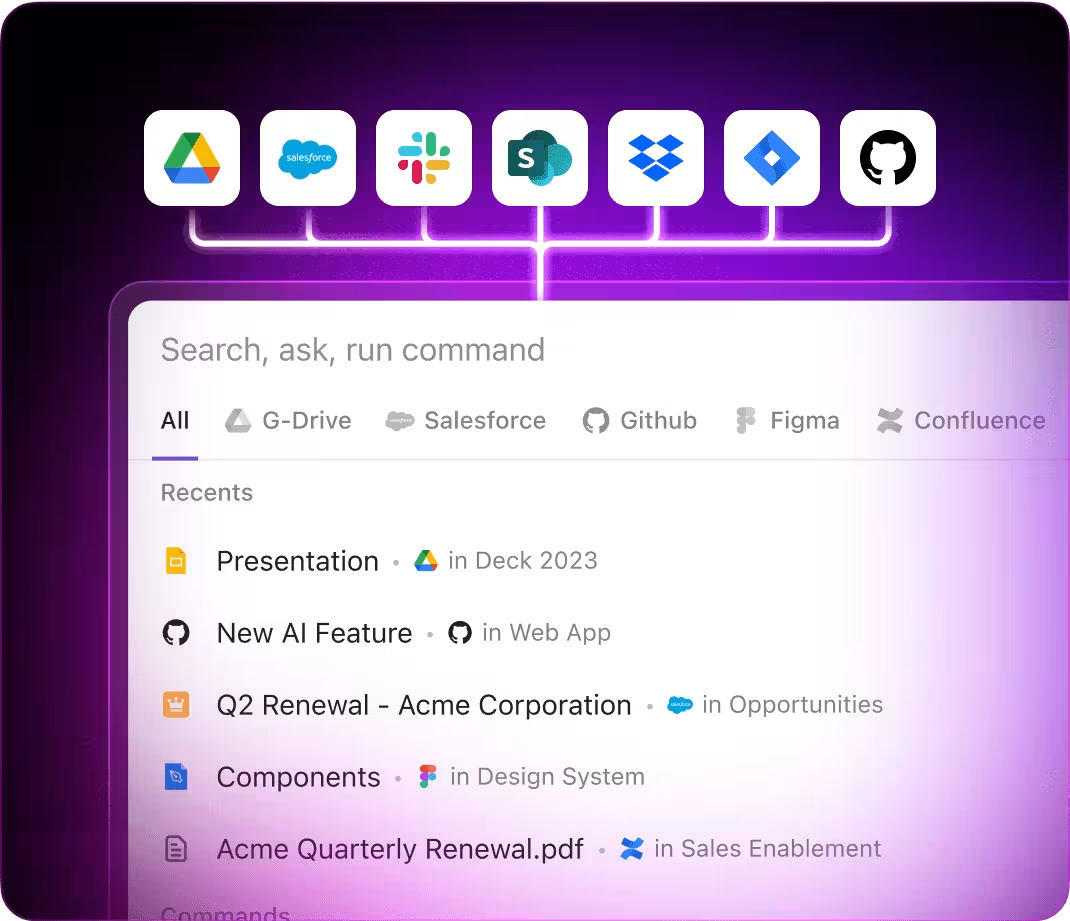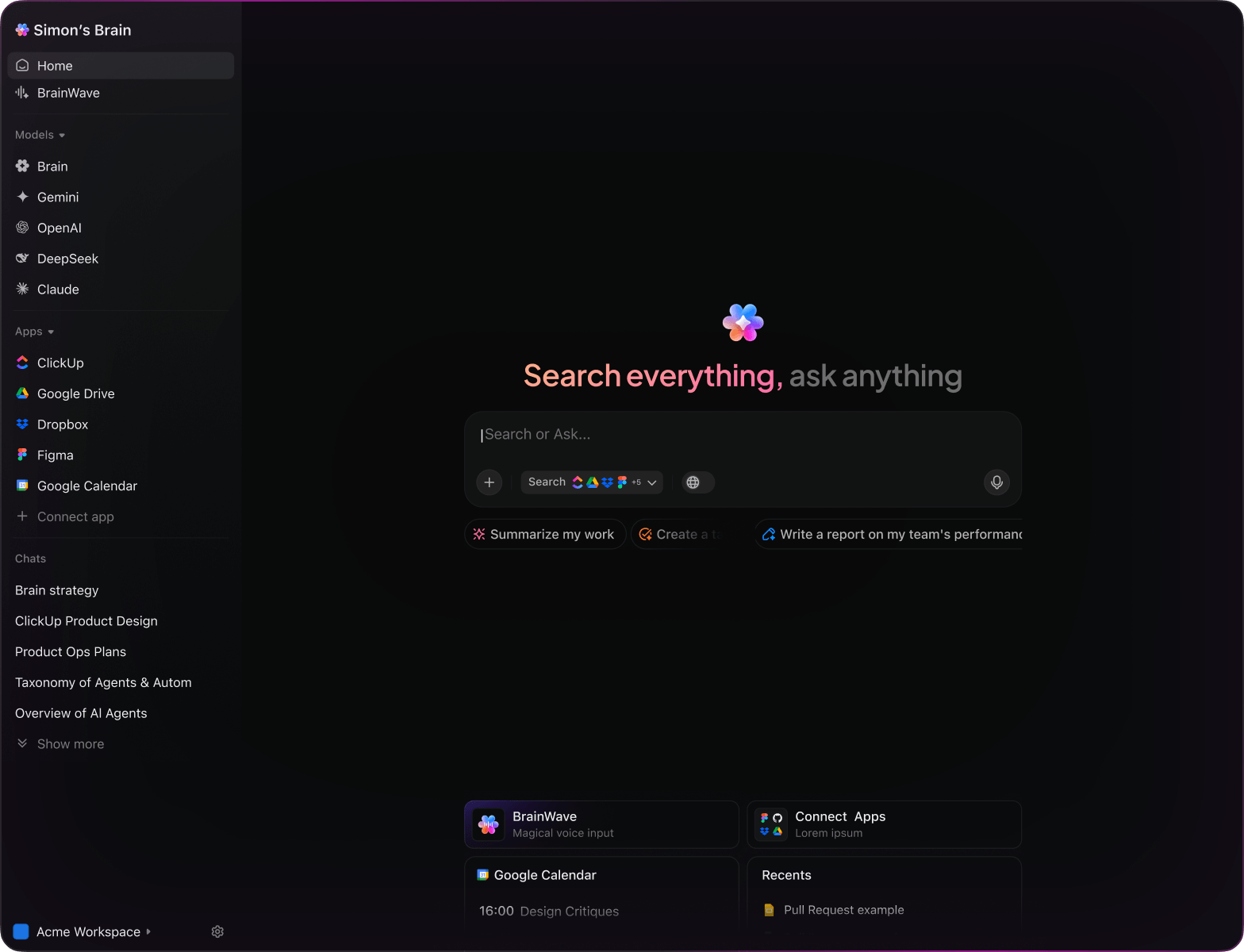AI Science Experiment Insights
Top AI Prompts for Science Experiments
Design precise experiments, organize your research, and accelerate discoveries using ClickUp Brain's intelligent assistance.

Trusted by the world’s leading businesses
AI in Scientific Research
AI Prompts Revolutionizing Science Experiment Planning
Crafting groundbreaking experiments goes beyond the lab bench—it’s about orchestrating every detail flawlessly.
From hypothesis formulation to protocol drafting, data collection, and analysis, managing scientific experiments requires juggling numerous components—and countless notes, revisions, and timelines. AI prompts are now indispensable in this process.
Researchers leverage AI to:
- Quickly identify relevant studies and methodologies
- Generate detailed experiment protocols and data collection templates
- Simplify complex scientific literature into clear summaries
- Transform scattered observations into organized plans, checklists, or project milestones
Integrated within familiar tools like documents, whiteboards, and task trackers, AI in platforms such as ClickUp Brain acts as a silent partner—turning your scientific ideas into structured, manageable workflows.
ClickUp Brain vs Conventional AI
Why ClickUp Brain Stands Out
Integrated, context-sensitive, and instantly accessible—so you focus on breakthroughs, not briefings.
Standard AI Solutions
- Constantly toggling between apps to collect details
- Repeating experiment objectives with every query
- Responses that miss the mark on your needs
- Hunting through multiple platforms for a single report
- Interacting with AI that lacks initiative
- Manually switching between different AI engines
- Merely another add-on in your browser
ClickUp Brain
- Deeply connected to your lab notes, tasks, and team insights
- Retains your project history and experiment aims
- Delivers precise, context-driven guidance
- Combines search across all your scientific resources
- Hands-free input with Talk to Text feature
- Automatically selects the optimal AI model: GPT, Claude, Gemini
- Dedicated desktop app for Mac & Windows—optimized for performance
Science Experiment Prompts
15 Essential AI Prompts for Science Experiments
Enhance your research—planning, analysis, and documentation simplified with ClickUp Brain.

Identify 5 innovative approaches for a plant growth experiment under varying light conditions, based on the ‘Spring 2025 Botany Study’ document.
ClickUp Brain Behaviour: Analyzes key concepts and experimental setups from the linked file to propose fresh experimental ideas.

What are the latest methodologies for measuring reaction rates in enzyme kinetics studies?
ClickUp Brain Behavior: Integrates findings from internal research papers; Brain Max can supplement with current external scientific literature if accessible.

Draft a detailed protocol for a soil pH testing experiment inspired by standard environmental science practices. Reference Lab Notes #8 and previous experiment summaries.
ClickUp Brain Behavior: Extracts relevant instructions and data from linked documents to compose a clear, step-by-step protocol.

Summarize comparative results of photosynthesis efficiency between C3 and C4 plants using our ‘Photosynthesis Q2’ report.
ClickUp Brain Behavior: Pulls quantitative and qualitative data from internal reports to generate a concise comparative summary.

List common buffer solutions used in biochemical assays, referencing R&D notes and supplier datasheets.
ClickUp Brain Behavior: Scans internal documents to identify frequently used buffers and their properties relevant to experiment stability.

From the ‘Microscope Calibration’ document, create a checklist for ensuring equipment accuracy before experiments.
ClickUp Brain Behavior: Detects calibration steps and converts them into an actionable checklist within a task or document.

Summarize 3 emerging techniques in CRISPR gene editing from recent research and technology review documents post-2024.
ClickUp Brain Behavior: Extracts key innovations and recurring themes from linked scientific papers and notes.

From the ‘Student Lab Survey Q1’ document, summarize main preferences for virtual lab simulations.
ClickUp Brain Behavior: Analyzes survey data to highlight common feedback and design preferences for educational tools.

Compose clear and engaging instructions for a DNA extraction kit, using the tone guide in ‘LabManualTone.pdf’.
ClickUp Brain Behavior: References style guidelines to generate user-friendly and concise instructional text for lab materials.

Summarize recent updates in chemical safety regulations for 2025 and their implications for lab experiment protocols.
ClickUp Brain Behavior: Reviews linked compliance documents and synthesizes key changes affecting experimental procedures.

Generate guidelines for labeling and storing biological samples, referencing region-specific compliance documents in our workspace.
ClickUp Brain Behavior: Extracts labeling standards, storage conditions, and regulatory notes to form a comprehensive compliance checklist.

Create a checklist for conducting a controlled temperature experiment using US EPA 2025 guidelines and our lab equipment folder.
ClickUp Brain Behavior: Identifies procedural requirements from readable documents and organizes tasks by experimental phase or risk level.

Compare eco-friendly materials used in lab consumables across major suppliers using our competitive analysis documents.
ClickUp Brain Behavior: Summarizes documented comparisons into a clear, concise format (table or brief).

What are the latest trends in remote experiment monitoring technologies since 2023?
ClickUp Brain Behavior: Synthesizes insights from internal research notes, product summaries, and uploaded reports.

Summarize main usability challenges reported in Southeast Asia’s field research equipment feedback folder (durability, interface, portability).
ClickUp Brain Behavior: Extracts and ranks user-reported issues from surveys, feedback notes, and tagged support tickets.
Innovate Science Projects Quicker with ClickUp Brain
Cut down trial-and-error, unify your research team, and create superior experiment plans using AI-driven workflows.






AI Prompts for Science Experiments with ClickUp Brain
Discover How ChatGPT, Gemini, Perplexity, and ClickUp Brain Enhance Scientific Research Planning
Prompts for ChatGPT
- Outline a 5-step experiment plan focusing on testing plant growth under different light conditions.
- Compose a research abstract for a study on water purification methods highlighting efficiency and cost.
- Suggest 3 variations of chemical reaction setups to observe rate changes and explain expected outcomes.
- Draft a detailed protocol for measuring enzyme activity in various temperatures.
- Summarize findings from recent soil sample analyses emphasizing nutrient content and contamination levels.
Prompts for Gemini
- Propose 3 innovative apparatus designs for measuring air quality in urban environments.
- List novel data visualization techniques for presenting experimental results on photosynthesis rates.
- Describe a conceptual framework for a lab notebook app tailored for biology experiments.
- Recommend ergonomic layouts for a multi-station chemistry lab prioritizing safety and workflow.
- Create a comparison chart of different microscope types focusing on magnification, resolution, and usability.
Prompts for Perplexity
- Identify 5 sustainable materials for building experimental setups and evaluate their durability.
- Compare various statistical methods for analyzing experimental data, highlighting strengths and limitations.
- Summarize recent trends in citizen science projects and their impact on data collection.
- List 5 innovative sample storage solutions for biological specimens ranked by preservation quality.
- Review past experiment designs on enzyme kinetics and extract key improvements for future studies.
Prompts for ClickUp Brain
- Transform this lab meeting transcript into clear, assigned tasks with deadlines.
- Summarize experiment observations and generate follow-up action items for the research team.
- Analyze annotated experiment diagrams and create a checklist for equipment calibration.
- Compile a task list from cross-disciplinary discussions on data analysis methods, prioritizing urgent items.
- Summarize participant feedback from recent trials and generate actionable improvements in ClickUp.
Why ClickUp Works for You
Transform Early Thoughts Into Clear Plans
- Quickly convert scattered notes into polished experiment outlines.
- Generate innovative hypotheses by reviewing previous research data.
- Build custom templates to accelerate your scientific workflows.
Brain Max Boost: Effortlessly explore past experiments, observations, and reports to fuel your upcoming projects.

Why Choose ClickUp
Accelerate Science Experiment Planning
- Break down intricate hypotheses into manageable tasks.
- Transform lab notes into organized, assignable action items.
- Automatically create experiment summaries and progress reports without extra effort.
Brain Max Boost: Instantly access previous experiment results, chemical inventories, or protocol variations across your projects.

AI Advantages
How AI Prompts Enhance Every Phase of Science Experiments
AI prompts accelerate discovery and inspire more insightful, reliable experiments.
Quickly Develop Hypotheses
Researchers explore innovative ideas rapidly, make informed choices, and avoid analysis paralysis.
Improve Experimental Planning
Enhance decision-making, reduce errors, and design experiments that yield meaningful, reproducible results.
Identify Flaws Early in the Process
Prevents expensive late-stage corrections, boosts data quality, and shortens research cycles.
Align Teams Across Disciplines
Enhances communication, prevents misunderstandings, and accelerates consensus among scientists, technicians, and analysts.
Drive Scientific Innovation Forward
Ignites creative approaches, supports cutting-edge methodologies, and keeps your research at the forefront.
Integrated AI Support Within ClickUp
Transforms AI insights into actionable steps that advance your experimental projects.
Boost Your Science Workflow
Cut down mistakes, simplify collaboration, and generate insightful results using AI support.





